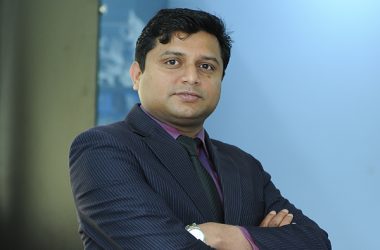
“Does society want people to feel confident in solving their problems in a court?” DIFC Courts CEO Mark Beer OBE understands better than anyone just how traditional legal systems inspire trepidation in claimants and defendants alike across the globe. “If so, give them access to one from their mobile phone. Let them beam into a court room and give evidence from a smartphone.”
Governed by English common law, DIFC Courts’ verdicts are enforced in jurisdictions including England, Wales, New York and Singapore. Its ‘Smart Small Claims Tribunal’ – a video-driven digital court that can be accessed by case participants from across the globe – has already received international acclaim. It has been visited by Tanzanian and Qatari delegations, who are now keen to follow its example, while eight members of parliament (MPs) from the United Kingdom visited in April for a first-hand look at how the Smart SCT operates, and the role it plays in attracting businesses to the UAE. MP for Eddisbury, Antoinette Sandbach, lauded the project on her visit. “The Smart SCT works so quickly and has great advantages for commercial relationships. It actually looks like this small claims system works more effectively and quickly than ours does back in the UK.”
Beer, meanwhile, is in no doubt that the physical nature of traditional courtrooms has cemented their place over time as an intimidating, restricted institution that is growing increasingly unfit to solve complex and far-reaching disputes. “Courts are traditionally held in a premises,” he says. “That’s fine, but we’re in a global world now, so it’s not one party on the high street suing a neighbour who lives down the road anymore. It’s a case of a company in China who supplies iron ore to a company in America who uses to it to build a car, but when the product arrives it isn’t as they expect. How do you establish a court that can solve these problems? The only way is through technology. It needs technology to allow parties to come together in a forum which best serves their interest in finding a solution.”
He believes a change of mindset, centred around increased openness, will be key in achieving this goal. “Courts will have to realise they’re part of an interconnected global world, and the service that they offer will have to follow suit. DIFC Courts is focused on hyper-connectivity to make sure we are the most connected court in the world, and that wherever you are, we’ll be able to help you.”
While the buildings which have traditionally housed court cases have not changed, they have been reinforced by systems that Beer believes are outdated, and hindered by a shortfall in attempts to adopt modern, practical technology. However, he also says that the motivation to do so is conspicuous by its absence. “There hasn’t been a sufficient incentive to digitalise the legal industry,” he says. “Forget AI, we haven’t done any IA – intelligent automation. Most courts think that means moving onto an Excel spreadsheet, and that’s caused many courts around the world to lag behind other mechanisms for solving disputes, including arbitration, mediation or private sector resolutions.”
On a wider level, Beer is in no doubt that courts at large have a moral obligation to comfort the afflicted, and to instil widespread faith in a country’s legal system. This means being a trustworthy service provider, not an intimidating punishment mechanism. “For hundreds of years, people have thought a court’s role is to be a cold, dark, windowless room where people are punished for having done the wrong thing,” he says. “That’s wrong, and is not the right approach to solving problems. Courts are meant to provide a service, which is to help people answer a question that they can’t answer themselves, pure and simple.”
As well as needing to make courts more user friendly, Beer also believes that making the overall citizen experience more positive is crucial in building trust. “Research has shown us that the better the service a court offers, the higher the chance of the parties settling, which has got to be a good outcome for any court to look at settlements as a KPI,” he says. “The perception of justice in the market has more to do with how people view the journey in the court than the decision at the end.”
He goes on to add that nations who choose to adapt their legal systems will help to foster a feeling of trust towards the state. “There is no doubt in my mind that we will see radical transformations in countries and states who want to be seen as being a safe place to live, where citizens have faith in society. They will be the ones who invest heavily in court systems. They will do better economically and socially than societies who don’t.”
While the need to deliver an improved experience for court users is a top priority for Beer, he is also mindful that technology could be set to transform the jobs of millions of legal professionals. Research from The University of Oxford and Citi has revealed that a staggering portion of jobs are at risk of being automated – 47 percent of those in the US, 77 percent of those in China and 85 percent of those in Ethiopia – and Beer does not believe that the legal profession is exempt from this potential cull. He believes that even highly trained and intelligent legal professionals who may perceive their skills to be indispensable are sorely mistaken. “We’re moving to a world where the commoditised delivery of a professional service is valueless,” he says. “If you’re going to be a lawyer, you need to do something different. Technology is disintermediating the legal service in the same way that it’s disintermediating the medical service and teaching. It takes away a commoditised service that lawyers have traditionally been able to charge you by the hour for.” However, he does believe there is light at the end of the tunnel for those who are willing to adapt. “At the moment, computers can’t create or think outside of the box, but they soon will. They also can’t build human relationships as well as we can.”
Although Beer acknowledges that human beings are fundamental in the role of a successful court, he does believe that less critical cases could be managed via automation. “We’re already seeing that computers are as good as, and if not better than us at dealing with small disputes,” he says. “Look at DoNotPay. Before, if you got a speeding ticket, you’d go to a lawyer who’d charge more than the cost of paying it off. Now, you go to a website, type in your ticket number, choose your defence from a drop-down menu, then they process the whole thing for you. It’s achieving a success rate beyond any lawyer’s imagination.” He believes judicial systems would be enhanced by similar initiatives. “A vast amount of complaints can be taken out of the system by making it more efficient. You can leave the courts to what they do best, which is dealing with complex, technical cases.”
Beer’s thinking isn’t confined to the legal industry. He has already spied a gap in the market for the ways that everyday retail disputes are solved. “How long until there’s a global online platform for them? If you look at what Alibaba are doing in Hangzhou, and Tencent, eBay and Amazon are doing with their platforms in Shenzhen, these are privately led dispute services, but ultimately, they’ll need to convert their decision into being a matter of law. I think we’ll see the intersection of private dispute resolution and public dispute resolution in order to cater for the global retail market. Governments will need to decide whether they are happy to let the private sector take over some of these mechanisms.”
In the meantime, Beer is playing his part in helping Dubai swiftly adjust its legal system to the range of emerging technologies that could flood the market. The organisation has partnered with the Dubai Future Foundation to deliver the Courts of the Future Forum, which will bring together technology and legal experts to evaluate the implications and uses of emerging technologies. Courts of the Future is already exploring judicial issues around the ownership and use of data; cybersecurity and data breaches and licensing and standards for technologies like connected, autonomous and flying cars, drones, 3D printers and Blockchain.
DIFC Courts’ new Technology and Construction Division, meanwhile, will hear technology-related cases including those around cybercrime incidents, disputes over the ownership and use of data, and issues relating to emerging technologies like artificial intelligence and connected vehicles.
“We’re only offering a small part of a much broader governmental programme – with initiatives such as Smart Dubai and 10X – to ensure that Dubai remains a city of the future,” Beer says. “Another part of it will be the legislative regime, and making sure the laws are up to the standards of such a city. We’ve already seen reform at a legislative level in relation to driverless cars, drones and other initiatives. Making sure that legislation keeps pace with technological demands will be significant, but Dubai is doing more than any other city to make sure that laws keep pace.”





